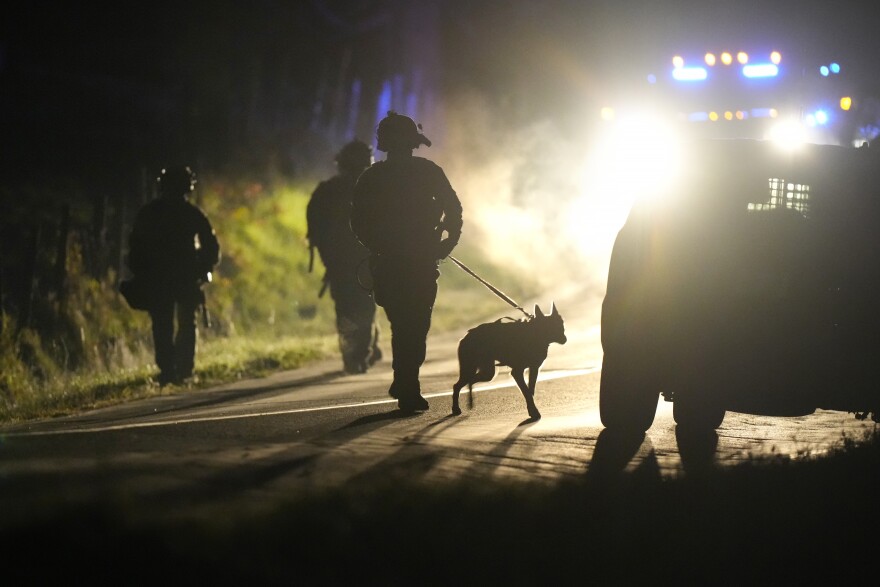Details are still emerging about the man accused of killing 18 people in Lewiston and sparking one of the largest manhunts in Maine history. But some of those details are raising new questions.
Police have released little information about Robert R. Card, aside from that he is a 40-year-old Bowdoin resident who should be considered armed and dangerous. During a press conference on Thursday, Commissioner Michael Sauschuck with the Maine Department of Public Safety declined to answer questions about Card’s mental health or potential motives.
"He is viewed as a suspect and there is a full-court press by all of our partners to bring him into custody," Sauschuck said.
But a picture of Card has begun to emerge from other official sources, family and community members.
Born in Maine in 1983, he attended the University of Maine but apparently never graduated. He enlisted in the U.S. Army Reserve in 2002 and an Army spokesman said Thursday that he was a "petroleum supply specialist" in the Reserves who currently holds the rank of sergeant 1st class. Although he has received several awards, Card has never participated in a combat deployment during his two decades, the Army said.
Card was assigned to a 3rd Battalion, 304th Infantry Regiment unit out of Saco that provides firearms training, including to cadets at the U.S. Military Academy in West Point. A supposed police bulletin that began circulating widely in the media late Wednesday described Card as "a trained firearms instructor" based out of a Saco unit. The Maine State Police and the office of Gov. Janet Mills have not confirmed the bulletin, which was labeled as "unclassified/law enforcement sensitive" under the letterhead of a state police unit. They have not denied or publicly discounted the document's content either, however.
But Army spokesman Bryce Dubee said in a statement Thursday evening: "The Army did not train (Sgt. 1st Class) Card as a firearms instructor, nor did he serve in that capacity for the Army. Due to the Privacy Act and the ongoing investigation, we cannot provide further details."
Dubee said that while the Saco-based unit "supported West Point summer training in July of 2023, there are no records to indicate (Card) instructed or participated in any training." It was during that training that Card reportedly experienced a mental health event that prompted him to be admitted to a facility.
According to NPR, a spokesperson for the New York National Guard spokesman said Card was "behaving erratically" in July while his unit was training at West Point.
"Out of concern for his safety, the unit requested that law enforcement be contacted," reads the statement provided to NPR. "New York State Police responded and transported Card to Keller Army Community Hospital at the United States Military Academy for medical evaluation."
The National Guard spokesperson did not provide additional details about what happened after the evaluation. But the unconfirmed police bulletin said Card was committed to a mental health facility for two weeks last summer before being released. That bulletin also said Card “recently reported mental health issues to include hearing voices and threats to shoot up the National Guard Base in Saco, ME.”
Members of Card's immediate family could not be reached on Thursday by Maine Public. His sister-in-law, Katie Card, had told the Daily Beast earlier in the day that Card had been a quiet, “loving” and kind person but that things had "gone downhill recently" after he began hearing voices.
Katie Card also told the Bangor Daily News via text message that she and other family members had been messaging Card, urging him to turn himself in.
“At the moment we are working extensively with law enforcement,” she said. “Our hearts break for these families, they’re all in our prayers. If Rob is listening, we love him and we can help, but he needs to turn himself in.”
It was unclear whether any attempts had been made to separate Card from his firearms following his alleged treatment for mental health concerns over the summer.
Maine adopted a so-called “yellow flag” law several years ago that allows police to ask a judge to force a person to temporarily relinquish their guns and block them from acquiring additional firearms if a medical professional deems the person poses a threat to themselves or others. It has been used fairly sparingly in Maine during its first several years, Maine Public has reported.
Maine’s law is different from the “red flag” laws in place in some other states because those allow family members to directly petition the courts to force someone to temporarily give up their firearms. Some states’ red flag laws also require police or prosecutors to obtain an “extreme risk protection order” if there is credible evidence that the person may attempt to harm others. Some advocates for red flag laws say Maine’s approach, while a step in the right direction, does not go far enough because it does not allow family members to directly petition a court to remove someone’s guns and because it adds the additional step of requiring a medical professional to deem the person as a threat to themselves or others.
Sauschuck with the Maine Department of Public Safety declined to provide more information when asked about Card’s access to guns during Thursday’s press conference.
“I do think that the statutes around firearms and the possession of those are pretty complex,” Sauschuck said. “I know that we will be reviewing that information as we move forward. But that’s not an answer that we are prepared to give today because that leaves to motive. And you are talking about behavioral health issues and how that impacts this situation. I expect that you’ll hear back from us in the future.”





